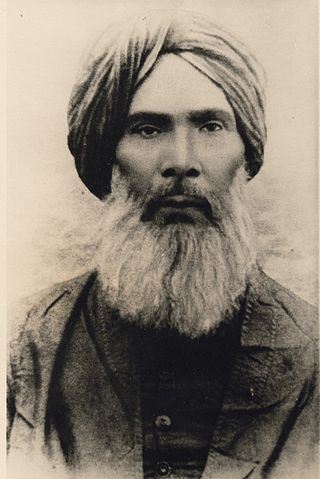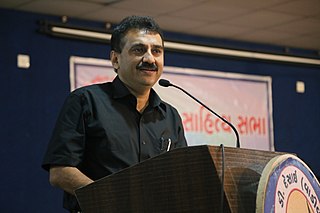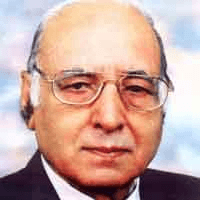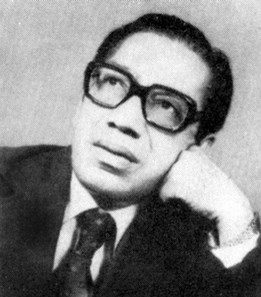Related Research Articles

The ghazal is a form of amatory poem or ode, originating in Arabic poetry. A ghazal may be understood as a poetic expression of both the pain of loss or separation and the beauty of love in spite of that pain.

Urdu poetry is a tradition of poetry and has many different forms. Today, it is an important part of the cultures of South Asia. According to Naseer Turabi there are five major poets of Urdu which are Mir Taqi Mir (d.1810), Mirza Ghalib, Mir Anees, Allama Iqbal and Josh Malihabadi (d.1982). The language of Urdu reached its pinnacle under the British Raj, and it received official status. All famous writers of Urdu language including Ghalib and Iqbal were given British scholarships. Following the Partition of India in 1947, it found major poets and scholars were divided along the nationalistic lines. However, Urdu poetry is cherished in both the nations. Both the Muslims and Hindus from across the border continue the tradition.

Khan Abdul Ghani KhanSI was a Pashtun philosopher, poet, artist, writer and politician. He was a son of Abdul Ghaffar Khan, a prominent British Raj-era Indian independence activist. Throughout his life as a poet in both British India and Pakistan, Khan was known by the titles Lewanay Pālsapay and Da īlam Samander.
Ameer Hamza, commonly known as Hamza Baba, was a prominent Pashto and Urdu language poet. His books are taught on master levels in University of Peshawar. At least 5 scholars did their Ph.D research thesis on him. He is considered a bridge between classic Pashto literature and modern literature. He founded Khyber School of thought in Pashto literature. Most notable poets of this school of thought like Nazir Shinwari, Khatir Afridi, Khyber Afridi were his pupils.

The Pashto media includes Pashto literature, Pashto-language newspapers, magazines, television and radio stations, as well as Pashto films and Pashto internet. Pashto media involves the Pashtuns of Pakistan, Afghanistan and the Pashtun diaspora around the world.

Pashto literature refers to literature and poetry in Pashto language. The history of Pashto literature spreads over five thousands years having its roots in the oral tradition of tapa. However, the first recorded period begins in 7th century with Amir Kror Suri. Later, Pir Roshan (1526–1574), who founded his own Sufi school of thoughts and began to preach his beliefs. He gave Pashto prose and poetry a new and powerful tone with a rich literary legacy. Khair-ul-Bayan, oft-quoted and bitterly criticized thesis, is most probably the first book on Sufism in Pashto literature. Among his disciples are some of the most distinguished poets, writers, scholars and sufis, like Arzani, Mukhlis, Mirza Khan Ansari, Daulat and Wasil, whose poetic works are well preserved. Akhund Darweza (1533–1615), a popular religious leader and scholar gave a powerful counterblast to Bayazid’s movement in the shape of Makhzanul Islam. He and his disciples have enriched the Pashto language and literature by writing several books of prose.

Mareez, born Abbas Abdul Ali Vasi, was a Gujarati poet, mainly popular for his Ghazals. He is popularly known as Ghalib of Gujarat. He left studies in young age and started working in rubber shoe factory. Having been interested in poetry, he took up journalism but remained financially unstable throughout his life. He wrote Ghazals published in collections but many of his works remained uncredited which he sold during his financial difficulties. His popularity escalated after his death.

Ameer Minai or Amir Meenai was a 19th-century Indian poet. He was respected by several contemporary poets including Ghalib and Daagh Dehalvi and by Muhammad Iqbal. He wrote in Urdu, Persian and Arabic.

Akhtar Raza Saleemi is a Pakistani Urdu, Hindko, and Potohari poet, novelist, writer, critic and editor. His birth name is Muhammad Pervaiz Akhtar . He is a recognized poet of both ghazal and nazm. He has published several poetry books and has been appreciated for his work by critics. He stayed in the genre of poetry till 2008 and then started experimenting with the style of novel writing. His fictional work often combines Magic realism and Historical fiction with a special focus on his life in his hometown. The topics of death and dreams are predominant in his novels.
Sahir Hoshiarpuri, born Ram Parkash Sharma was an Urdu poet from India. He wrote several poetry books; his main form was ghazal. Moreover, his several ghazals have been sung by leading singers including Jagjit Singh.
Naresh Kumar Shad was a ghazal, qat'aa and rubai writer.
Qayyum Nazar, was a prominent Urdu language poet from Pakistan. Along with fellow Urdu poets Meeraji and Noon Meem Rashid, Nazar was a member of the Pakistani literary circle, Halqa-e Arbab-e Zauq. Nazar was born in Lahore in British Raj, India. He worked as a professor at the Government College, Lahore. He wrote many books of Urdu poetry, specializing in classical forms of poetry. His first published ghazal was printed in 1933. He represented the new wave of Urdu ghazals and was impressed by many classic Urdu poets, especially two other masters of the ghazal, Mir Taqi Mir, an 18th-century poet considered the founder of Urdu poetry, and Fani Badayuni, an earlier 20th-century Urdu poet.

Raeesh Maniar is a Gujarati language ghazal poet, translator, playwright, columnist, compere, lyricist and script writer from Gujarat, India. His significant works include Kafiyanagar (1989), Shabda Mara Swabhavma J Nathi (1998) and Aam Lakhvu Karave Alakh Ni Safar (2011). He has written two reference books for students of ghazals, Ghazal: Roop ane Rang (2006) and Ghazal Nu Chhandovidhan (2008). The later work contains original research that may be applicable to prosody of all north Indian languages. He has written lyrics for several Gujarati and Hindi language movies. The Indian National Theater of Mumbai awarded him the Shayda Award for 2001 and the Kalapi Award for 2016 for his contributions to Gujarati ghazal poetry.
Abaseen Yousafzai is a Pashtun poet from Pakistan. He is the chairman of Pashto Department in Islamia College Peshawar. Yousafzai has had his poetry published across the Durand Line. Abaseen Yousafzai joined the Islamia College Peshawar as a lecturer of Pashto in 1993.
Ikramullah Gran Bacha (1941-2014), commonly known as Gran Baba, was a Pashto-language poet, ghazal writer and fiction writer from Pakistan. He died at the age of 73.
Mohammad Ghazi, known by his pen name Ghazi Sial and by an honorific title in Pashto literature as Baba Sandara, was a Pakistani poet and Pashto folk song writer. He wrote sixteen books in Pashto language.

Mohammad Ibrahim Baig, known by his pen name Khatir Ghaznavi; romanized: K̲h̲āt̤ir G̲h̲aznavī, was a Pakistani multilingual writer, poet, playwright, research scholar, and director of Pakistan Academy of Letters. He wrote about forty-five to fifty books, including poems and children's books in Urdu, Hindko and Pashto languages throughout his life, though most of his literary work appears published in Urdu and Hindko.

Ahmad Shah, known by his pen name as Farigh Bukhari, was a Pakistani multilingual poet and progressive writer. He wrote books, including poetry on various subjects such as literature, social issues and politics in Hindko, Pashto and predominantly in Urdu language. Some of his publications appears about universal values and humanism.

Afghan literature or literature of Afghanistan refers to the literature produced in the Islamic Emirate of Afghanistan. Influenced by Central and South Asian literature, it is predominantly written in two native and official languages of Afghanistan, Dari and Pashto. Some regional languages such as Uzbek, Turkmen, Balochi, and Pashayi also appears in Afghan literature. While Afghanistan is a multilingual country, these languages are generally used as oral compositions and written texts by the Afghan writers and in Afghan curriculum. Its literature is highly influenced by Persian and Arabic literature in addition to Central and South Asia.
References
- 1 2 "Legendary poet Rahmatullah Dard passes away - The Express Tribune". 1 September 2016.
- ↑ Report, Bureau (3 September 2016). "Rahmatullah Dard praised as poet of peace".